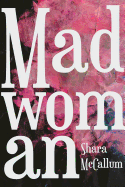
Memory, fable and family history feature strongly in Madwoman, Shara McCallum's fifth collection of poetry. Sprinkled throughout with poems written in Jamaican patois, McCallum uses changes in language and structure--traditional poetic forms, lists, question-and-answer dialogues--expertly to reveal and question limits in the knowledge of self.
The riveting madwoman appears variously as a character in a parable, a seemingly autobiographical first-person voice and the object of direct address. Madwoman is mythic deity, petulant child and modern woman in one, and the combination is strange and familiar, mysterious and poignant. Madwoman is "the anorectic who starves her flesh so others may eat. The whore whose sex blooms thorns.... The mother whose placid gaze masks the storm gathering fury into its centre." But lest the reader too comfortably embrace this mighty, vengeful character, McCallum delivers warnings against complacency. In one piece, the speaker admonishes herself and her audience, saying, "Even how yu is big woman, come in like yu forget/ what people can do. Gal, yu too trusting." McCallum brings ancestry and place to the forefront in examining identity as well, as in the pantoum "Lucea, Jamaica," in which the delicate structure deftly mimics an evolution in the speaker's understanding: "Coming to a country I thought I knew--/ a young woman then,/ liquid and open-fleshed--/ I saw there what I could not carry."
"Madwoman Apocrypha" asks, "Q: What created you?/ A: A breach in the self." There is beauty here in the courage to remember, and in daring to forget. --Richael Best, bookseller, the Elliott Bay Book Company, Seattle, Wash.

